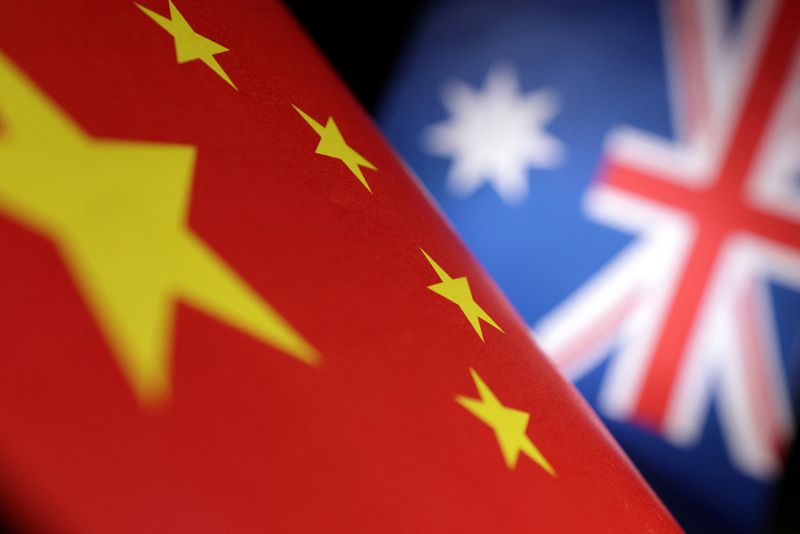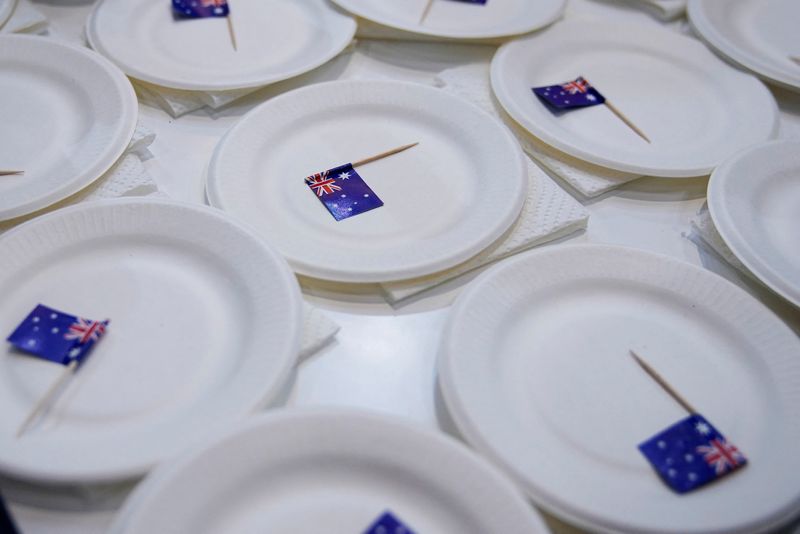By Lewis Jackson and Muyu Xu
SYDNEY (Reuters) - More than three years since China first blocked a range of Australian imports in a political dispute, restrictions are easing, but reviving trade is proving more challenging than stopping it in the first place.
A leaders meeting late last year set off a thaw in relations that saw China relax restrictions on coal in January. But three months on, in March, coal imports were still a third the 2016-2019 average.
Bureaucratic inertia meant word took weeks to filter to Chinese customs officials, say traders, who had to visit eight government departments to sort permits. In February, Australia was still not in the import license computer system, say buyers.
The economics have also worsened. Australian miners have found new customers in the interim and no longer offer concessional prices on coking coal. Meanwhile, cheaper imports from Russia and Mongolia have taken market share in China.
"These things take time, there is no magic wand to bring everything back to normal, it will be a slow process over several months," said David Olsson, chair of the Australia China Business Council.
Relations between China and Australia first soured in 2017 when Canberra voiced concern over China's militarisation of disputed islands in the South China Sea and introduced laws criminalising foreign interference that were seen as aimed at Beijing.
After Australia called for an inquiry into the origins of COVID-19, China responded with trade curbs in 2020 that throttled roughly A$17 billion of Australian imports from coal to timber.
The sluggish resumption of the coal trade suggests that reviving the markets, logistics and expectations that greased trade in restricted products could take months if not years.
Overall, however, Australian exports to China have surged despite the curbs, rising to A$175 billion last year from A$149 billion in 2019 in large part thanks to a booming iron ore trade too vital for China's steel mills to risk disrupting.
(Graphic: Sluggish restart to the China-Australia coal trade, https://www.reuters.com/graphics/AUSTRALIA-CHINA/TRADE/zdvxdjdqzvx/chart_eikon.jpg)
The centre-left Labor government has made the restoration of unrestricted trade a priority and the end of coal restrictions were an early win. Foreign Minister Penny Wong travelled to Beijing in December and the trade minister is expected within weeks to make the same trip.
Last month, the countries agreed to resolve within three months a World Trade Organisation dispute over Chinese barley tariffs. Australia's trade minister is confident wine tariffs will follow.
One issue is a potential shortage of the Australian customs workers who certify cargoes for export. Many left when the now restricted timber log trade vanished overnight, said Frank Rudkiewicz, who is an "authorised officer" (AO) certified by the Agriculture Department to inspect export cargoes.
"There was so much work guaranteed and then overnight it all fell through," he said.
He was recently flown to Townsville from South Australia, roughly 1,800 kilometres north, to certify a consignment of grains because no one else was available.
Reuters spoke with three customs workers in three states. All mentioned shortages. One in Tasmania blamed "across-the-board" problems on government approvals that took up to 15 months, from six months previously.
The Department of Agriculture said in a statement it was not aware of any significant changes to the number of AOs. The average time from application to appointment is a minimum of 3-6 months and unchanged since 2011, the department added.
(Graphic: Barley exporters pivot after Chinese trade tariffs, https://www.reuters.com/graphics/AUSTRALIA-CHINA/TRADE/myvmoqokwvr/chart_eikon.jpg)
A NEW POLITICAL CLIMATE
Officials and exporters say competition, a desire to maintain new markets and wariness about the longevity of the diplomatic thaw will make a quick return to pre-restriction trade levels unlikely.
"Chinese coal traders see little incentive now to sign long-term contracts," said a Chinese-based coal trader, citing high inventory and "the potential risk of the relationship turning sour again."
In Australia, several producers of wine, timber and meat told Reuters they would not prioritise China at the expense of newer clients.
"It would be short sighted to lose the hard fought new businesses we've built," said David Foote, chair of Cattle Australia.
Producers who beat a path back to China will also face competitors who have had more than two years to make inroads.
Australian wine exports are unlikely to recover to pre-dispute levels soon because of entrenched French and Chilean competitors, said Lee Mclean head of Australian Grape & Wine.
Moreover, even as it works towards economic rapprochement, Australia has made clear unrestricted trade is not a signal to return to China at the expense of other markets.
And tensions between the two countries remain. Australia in February blocked a Chinese rare earth investment on national security grounds.

Foreign Minister Wong urged exporters to diversify even as she announced the deal over barley tariffs.
"We never want to find ourselves in a situation where we're so totally reliant on one market," Trade Minister Don Farrell said on Monday.
